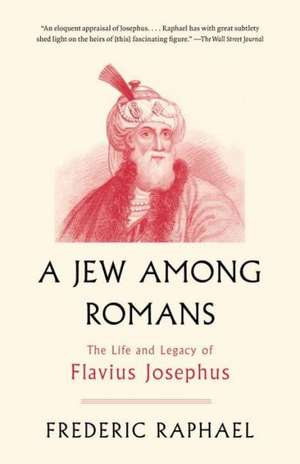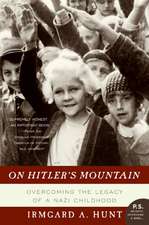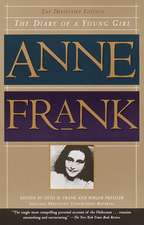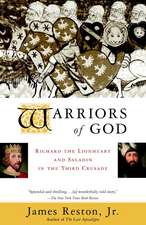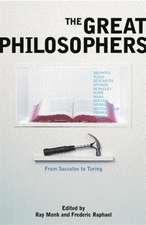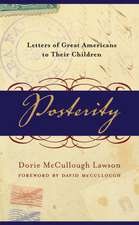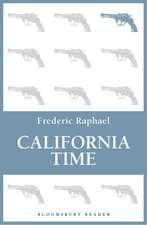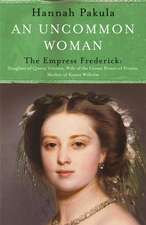A Jew Among Romans: The Life and Legacy of Flavius Josephus
Autor Frederic Raphaelen Limba Engleză Paperback – 7 oct 2013
Joseph ben Mattathias’s transformation into Titus Flavius Josephus, historian to the Roman emperor Vespasian, is a gripping and dramatic story. His life, in the hands of Frederic Raphael, becomes a point of departure for an appraisal of Diasporan Jews seeking a place in the dominant cultures they inhabit. Raphael brings a scholar’s rigor, a historian’s perspective, and a novelist’s imagination to this project. He goes beyond the fascinating details of Josephus’s life and his singular literary achievements to examine how Josephus has been viewed by posterity, finding in him the prototype for the un-Jewish Jew, the assimilated intellectual, and the abiding apostate: the recurrent figures in the long centuries of the Diaspora. Raphael’s insightful portraits of Yehuda Halevi, Baruch Spinoza, Karl Kraus, Benjamin Disraeli, Ludwig Wittgenstein, and Hannah Arendt extend and illuminate the Josephean worldview Raphael so eloquently lays out.
Preț: 135.03 lei
Nou
Puncte Express: 203
Preț estimativ în valută:
25.84€ • 26.83$ • 21.55£
25.84€ • 26.83$ • 21.55£
Carte disponibilă
Livrare economică 03-17 martie
Preluare comenzi: 021 569.72.76
Specificații
ISBN-13: 9780307456359
ISBN-10: 0307456358
Pagini: 336
Dimensiuni: 132 x 203 x 23 mm
Greutate: 0.3 kg
Editura: Anchor Books
ISBN-10: 0307456358
Pagini: 336
Dimensiuni: 132 x 203 x 23 mm
Greutate: 0.3 kg
Editura: Anchor Books
Recenzii
“Raphael joins a distinguished line of historians of Josephus, but few have accounted for the outcast sage so vividly. Raphael’s motion for acquittal is written in such spirited, lambent prose that he deserves to succeed where previous scholars have failed.”
—Stephen Daisley, Commentary
“Raphael’s magnificently odd book does not skimp on details about the life of Josephus . . . but the real focus is on his legacy. . . . Raphael transform Josephus, the thinking person’s Judas, into a figure of tragic grandeur and connects him with a wide of range of other Jewish writers, artists, scapegoats from Baruch Spinoza, Alfred Dreyfus, and Leon Trotsky to Isaac Babel, Walter Benjamin, and Joseph Roth. . . . [An] erudite book. . . . When Raphael imagines Josephus . . . his subject, to say nothing of his subject’s quandary, feels newly strange and complicated.”
—Tom Bissell, Harper’s
“To recalibrate Josephus’ legacy in modern times, the screenwriter and novelist Frederic Raphael, who was trained in classics at Cambridge University, has written A Jew Among Romans, an eloquent appraisal of Josephus. In the book’s first part, he skillfully recounts the transformation of Joseph ben Mattathias, a descendant of priests, into Titus Flavius Josephus, confidant of emperors. . . . As Mr. Raphael’s sharply etched account makes clear, the turncoat Josephus may have been a ‘sponsored propagandist.’ . . . In the second and bolder part of A Jew Among Romans, Mr. Raphael casts Josephus as a prototype of the alienated ‘un-Jewish Jew’ in the Diaspora. . . . [I]n capturing Josephus’ ambivalences and ambiguities, Mr. Raphael has with great subtlety shed light on the heirs of that fascinating figure: those memory-haunted thinkers, living on the borderlines of nations and religions, defined by the attempt to transcend the very tradition to which they were so richly indebted.”
—Benjamin Balint, The Wall Street Journal
“Expansive, sometimes frustrating, often fascinating boundary-crossing book. . . . [A] work of historical and literary reflection. . . . In the end, with its sprawling topic, rich visual prose, and obsession with odd characters, it reads like a thick description of an epic film that Raphael sees in his head. It is moving, fun, and sure to linger.”
—Winnipeg Free Press
“In the multitalented and prickly Raphael—novelist, classicist and Oscar-winning screenwriter for Darling (1965)—[Josephus] the ancient survivor has found his ideal judge, a man as certain of being a Jew as he is uncertain of the meaning of that fact, much as Josephus himself was. . . . The result is a mesmerizing study that evaluates Josephus’s choices within the context of internecine Jewish strife (both real and polemical) and overwhelming Gentile power.”
—Maclean’s
“Novelist, screenwriter and biographer Raphael succeeds admirably in recovering the reputation of much-maligned historian Titus Flavius Josephus. . . . Informed by scrupulous, sometimes exhaustive footnotes and addenda, the book is not simply an arresting biography, but a persuasive history of an era. Like his subject, Raphael’s breadth of intelligence works against single-mindedness. Throughout, he quotes the conclusions, often opposed to his reading, of other historians. Raphael is imposingly erudite and at pains to demonstrate it, yet there is a remarkable clarity to the writing, many elegant turns of phrase and a measure of sly humor.”
—Kirkus Reviews
“With the verve of good storyteller, novelist and biographer Raphael recreates Josephus’ life and chaotic times. . . . [A] page-turning chronicle.”
—Publishers Weekly
“In his marvelous hands, Frederic Raphael transforms Flavius Josephus from the self-hating Jew he is often portrayed as being to the first great critic of religious fundamentalism. A Jew Among Romans is especially relevant to a time when Jews argue so furiously with each other.”
—Alan Wolfe, author of Political Evil
“It is astonishing how many modern themes are thrown up by the vicissitudes of Josephus’ life of two millennia ago. With his Cambridge Classics scholars’ eye and his customary sophisticated wit—he simply cannot write a dull sentence—Frederic Raphael uses the life of the general-turned-historian to explore the issues of Jewish alienation and assimilation, of collaboration versus realism, of virility and vanity, of identity, love and the meaning of historical truth. The first modern Jewish historian and the first ever writer to use first-person prose, Josephus emerges as magnificently superior to those critics who have depicted him as a mere turncoat and traitor. Meanwhile, Raphael tells us something insightful on every page, about Edward Gibbon, the Wandering Jew, Stalin’s Jewish executioner, Arthur Koestler, the battle of Masada, Pharisees, Hellenists, Tsarist pogroms, Judas Iscariot, Zionism and the ancient laws on farting.”
—Andrew Roberts, author of The Storm of War: A New History of the Second World War
“Only someone with the gifts of Frederic Raphael could have written a book as original and wide-ranging as this one. His purpose is to explore the moral ambiguity of identity and loyalty that Jews from Josephus to Hannah Arendt have tried to deal with ever since the Roman conquest of Judaea. It is exhilarating to read history that properly illuminates the present.”
—David Pryce-Jones, author of Betrayal: France, the Arabs, and the Jews
“Joseph Ben Mattathias or—in his latter-day transformation as a Romanized historian of his own earlier role as failed leader of the Jewish nationalist revolt against Rome, 66-70 C.E.—Titus Flavius Josephus, is an extraordinarily modern character, who could easily, in all his political and moral ambiguity, have stepped straight out of a novel by John Le Carré. Understandably, he does not too often figure in the normal classical curriculum. To the rebels he led, and deserted, he became the ultimate traitor. To Romans, he was a pliable convert who nevertheless refused to go all the way to proper Romanitas. Now, at last, he has found his ideal biographer. Frederic Raphael was trained at Cambridge as classicist and philosopher, and has lived for years in France: he sees Joseph(us)’s dilemmas reflected in those of Albert Camus, the radical pro-Algerian who was nevertheless a pied-noir, a French colonialist malgré lui. With subtlety, irony, and acute insight into Diaspora politics, Raphael brilliantly disentangles, from ancient sources and modern scholarship, a psychologically convincing account of this ancient looking-glass war, and of the elusive individual who was both its chief protagonist and its much-reviled historian. It is a story with endless echoes of, and lessons for, eerily similar conflicts today, and Raphael tells it superbly.”
—Peter Green, author of The Hellenistic Age
“Frederic Raphael’s probing, reflexive essay on the life and legacy of Joseph ben Mattathias aka Flavius Josephus brilliantly straddles several mental and political worlds at once, situating—not always comfortably or comfortingly—its subject between Judaea and Rome, and us between a deeply troubled Roman middle east of the first century C.E. and several scarcely more serene hotspots of the modern western world.”
—Paul Cartledge, A.G. Leventis Professor of Greek Culture, University of Cambridge
“A Jew Among Romans is a truly immense achievement by any standards. I hope it gets the large readership it deserves.”
—William Lyons, emeritus professor of philosophy at Trinity College, Dublin
—Stephen Daisley, Commentary
“Raphael’s magnificently odd book does not skimp on details about the life of Josephus . . . but the real focus is on his legacy. . . . Raphael transform Josephus, the thinking person’s Judas, into a figure of tragic grandeur and connects him with a wide of range of other Jewish writers, artists, scapegoats from Baruch Spinoza, Alfred Dreyfus, and Leon Trotsky to Isaac Babel, Walter Benjamin, and Joseph Roth. . . . [An] erudite book. . . . When Raphael imagines Josephus . . . his subject, to say nothing of his subject’s quandary, feels newly strange and complicated.”
—Tom Bissell, Harper’s
“To recalibrate Josephus’ legacy in modern times, the screenwriter and novelist Frederic Raphael, who was trained in classics at Cambridge University, has written A Jew Among Romans, an eloquent appraisal of Josephus. In the book’s first part, he skillfully recounts the transformation of Joseph ben Mattathias, a descendant of priests, into Titus Flavius Josephus, confidant of emperors. . . . As Mr. Raphael’s sharply etched account makes clear, the turncoat Josephus may have been a ‘sponsored propagandist.’ . . . In the second and bolder part of A Jew Among Romans, Mr. Raphael casts Josephus as a prototype of the alienated ‘un-Jewish Jew’ in the Diaspora. . . . [I]n capturing Josephus’ ambivalences and ambiguities, Mr. Raphael has with great subtlety shed light on the heirs of that fascinating figure: those memory-haunted thinkers, living on the borderlines of nations and religions, defined by the attempt to transcend the very tradition to which they were so richly indebted.”
—Benjamin Balint, The Wall Street Journal
“Expansive, sometimes frustrating, often fascinating boundary-crossing book. . . . [A] work of historical and literary reflection. . . . In the end, with its sprawling topic, rich visual prose, and obsession with odd characters, it reads like a thick description of an epic film that Raphael sees in his head. It is moving, fun, and sure to linger.”
—Winnipeg Free Press
“In the multitalented and prickly Raphael—novelist, classicist and Oscar-winning screenwriter for Darling (1965)—[Josephus] the ancient survivor has found his ideal judge, a man as certain of being a Jew as he is uncertain of the meaning of that fact, much as Josephus himself was. . . . The result is a mesmerizing study that evaluates Josephus’s choices within the context of internecine Jewish strife (both real and polemical) and overwhelming Gentile power.”
—Maclean’s
“Novelist, screenwriter and biographer Raphael succeeds admirably in recovering the reputation of much-maligned historian Titus Flavius Josephus. . . . Informed by scrupulous, sometimes exhaustive footnotes and addenda, the book is not simply an arresting biography, but a persuasive history of an era. Like his subject, Raphael’s breadth of intelligence works against single-mindedness. Throughout, he quotes the conclusions, often opposed to his reading, of other historians. Raphael is imposingly erudite and at pains to demonstrate it, yet there is a remarkable clarity to the writing, many elegant turns of phrase and a measure of sly humor.”
—Kirkus Reviews
“With the verve of good storyteller, novelist and biographer Raphael recreates Josephus’ life and chaotic times. . . . [A] page-turning chronicle.”
—Publishers Weekly
“In his marvelous hands, Frederic Raphael transforms Flavius Josephus from the self-hating Jew he is often portrayed as being to the first great critic of religious fundamentalism. A Jew Among Romans is especially relevant to a time when Jews argue so furiously with each other.”
—Alan Wolfe, author of Political Evil
“It is astonishing how many modern themes are thrown up by the vicissitudes of Josephus’ life of two millennia ago. With his Cambridge Classics scholars’ eye and his customary sophisticated wit—he simply cannot write a dull sentence—Frederic Raphael uses the life of the general-turned-historian to explore the issues of Jewish alienation and assimilation, of collaboration versus realism, of virility and vanity, of identity, love and the meaning of historical truth. The first modern Jewish historian and the first ever writer to use first-person prose, Josephus emerges as magnificently superior to those critics who have depicted him as a mere turncoat and traitor. Meanwhile, Raphael tells us something insightful on every page, about Edward Gibbon, the Wandering Jew, Stalin’s Jewish executioner, Arthur Koestler, the battle of Masada, Pharisees, Hellenists, Tsarist pogroms, Judas Iscariot, Zionism and the ancient laws on farting.”
—Andrew Roberts, author of The Storm of War: A New History of the Second World War
“Only someone with the gifts of Frederic Raphael could have written a book as original and wide-ranging as this one. His purpose is to explore the moral ambiguity of identity and loyalty that Jews from Josephus to Hannah Arendt have tried to deal with ever since the Roman conquest of Judaea. It is exhilarating to read history that properly illuminates the present.”
—David Pryce-Jones, author of Betrayal: France, the Arabs, and the Jews
“Joseph Ben Mattathias or—in his latter-day transformation as a Romanized historian of his own earlier role as failed leader of the Jewish nationalist revolt against Rome, 66-70 C.E.—Titus Flavius Josephus, is an extraordinarily modern character, who could easily, in all his political and moral ambiguity, have stepped straight out of a novel by John Le Carré. Understandably, he does not too often figure in the normal classical curriculum. To the rebels he led, and deserted, he became the ultimate traitor. To Romans, he was a pliable convert who nevertheless refused to go all the way to proper Romanitas. Now, at last, he has found his ideal biographer. Frederic Raphael was trained at Cambridge as classicist and philosopher, and has lived for years in France: he sees Joseph(us)’s dilemmas reflected in those of Albert Camus, the radical pro-Algerian who was nevertheless a pied-noir, a French colonialist malgré lui. With subtlety, irony, and acute insight into Diaspora politics, Raphael brilliantly disentangles, from ancient sources and modern scholarship, a psychologically convincing account of this ancient looking-glass war, and of the elusive individual who was both its chief protagonist and its much-reviled historian. It is a story with endless echoes of, and lessons for, eerily similar conflicts today, and Raphael tells it superbly.”
—Peter Green, author of The Hellenistic Age
“Frederic Raphael’s probing, reflexive essay on the life and legacy of Joseph ben Mattathias aka Flavius Josephus brilliantly straddles several mental and political worlds at once, situating—not always comfortably or comfortingly—its subject between Judaea and Rome, and us between a deeply troubled Roman middle east of the first century C.E. and several scarcely more serene hotspots of the modern western world.”
—Paul Cartledge, A.G. Leventis Professor of Greek Culture, University of Cambridge
“A Jew Among Romans is a truly immense achievement by any standards. I hope it gets the large readership it deserves.”
—William Lyons, emeritus professor of philosophy at Trinity College, Dublin
Extras
I
Observed across the abyss of years, the rebellion in which Joseph ben Mattathias was to play a leading part appears like a remake of the story of David and Goliath. Despite the fact that, this time, Goli- ath won, the Jews’ defiant last stand, in 73 c.e., while defending the gaunt mountaintop fortress of Masada, in the southern desert, has been used, especially in modern Israel, to illustrate how the flower of the Jewish nation, having risen en bloc against imperial oppression, resisted to the last man. For some Zionists at least, the lesson of “the Jewish War” is that the only people Jews can trust are other Jews. The long story that Flavius Josephus lived to tell is less romantic and more complicated.
Ever since Alexander the Great conquered and appropriated the Persian Empire, only to have it break up into fractious kingdoms after his early death in 323 b.c.e., the Fertile Crescent had been a patchwork of fiefdoms, religions and antagonisms. Lacking gorgeous and impassable rivers or a bulwark of mountains, Judaea was regularly at the mercy of armies, which marched through it or chose to garrison its cities. Two of Alexander’s Macedonian marshals, Seleucus and Ptolemy, founded Middle Eastern empires. Their royal successors—Seleucids in Syria, Ptolemies in Egypt—played tug-of-war with Palestine for almost two centuries.
The Romans were only the last, the best disciplined and the most tenacious of the foreign invaders. As Josephus recalls in Jewish Antiquities, Rome’s intrusion into Judaea was the result of an unwise invitation from contending Jewish factions: in 63 b.c.e., Pompey the Great, who was playing for bigger stakes in nearby Syria, was called in as arbiter during a fraternal feud between Aristobulus (the last king of the Maccabean dynasty) and his ineffectual brother Hyrcanus, the High Priest. The latter served as a front for a rich, nominally Hellenized Idumaean called Antipater, who coveted the throne for himself.
Pompey had also been petitioned by a third group of Jews: the pious Zealots, who craved a return to a hermetic life that acknowledged no secular authority. Ultra-Orthodox, often lower-class, they advocated a purified theocracy, free of alien corruption and, of course, under their own leadership. It was their regular charge against the High Priest and his council, the Sanhedrin, that they habitually faced both (or several) ways. Zealots were vehement in accusing the hierarchy of being willing to trade Jewish independence in order to maintain their own standing. This did not inhibit fundamentalists from seeking to recruit Pompey to their cause.
The three Jewish parties had in common only the naïve presumption that the Romans would come in, cancel their enemies and then leave. In the event, Pompey did not give priority to a profitless squabble between native pretenders. First he completed the annexation of the Seleucid Empire to the greater glory of the Senate and the Roman people, and to his own and his soldiers’ financial advantage. Only after Aristobulus dared to anticipate his judgment, by raising an army of his own, did the Roman grandee march on Jerusalem.
The supporters of Hyrcanus opened the gates. Aristobulus and his men barricaded themselves in the Temple precinct. Neither then nor in Josephus’s day did the city’s Jews react with solidarity to external force. After a three-month siege, there was a massacre in which, Josephus says, twelve thousand Jews died, including those unresisting priests engaged in the exercise of their office.1 Josephus adds a bitter detail: “Most who fell were killed by their own countrymen of the rival faction; others beyond number threw themselves over the precipices.”
Pompey became the first Roman to stride into the curtained inner sanctum of the Temple. Perhaps in superstitious awe of its numinous vacancy, he touched nothing. Just over a century later, the curtain would be only a small part of the booty Titus took to Rome to swag his father’s triumph. The survivors among the priesthood, either because of their dignity or by virtue of the revenue at their disposal, had a chastening effect on Pompey. Inclined to fastidious gestures (malicious contemporaries accused him of being effeminate because he would scratch his head with one finger, in order not to distress his coiffure, which was set to resemble that of Alexander the Great), Pompey consented to the Temple being cleansed of blood and then licensed the resumption of the rites. He was remembered by the Jews more for his sacrilege than for his belated courtesy. Two centuries later, a gang of Jews desecrated the Egyptian tomb containing his headless corpse.
In 61 b.c.e., the evicted Aristobulus and his family, having been shipped to Rome, were obliged to walk in front of Pompey’s triumphal chariot; but they were spared the customary chains. A large contingent of Jews was also paraded in the ritual of the triumph. Such occasions had the allure of a mobile circus, complete with “floats” representing scenes from the victorious campaign.2 The festivities usually ended with the execution of defeated leaders, but the Judaeans appear to have been released when the metropolitan circuit was complete. A number remained to swell the Jewish community in Rome. It grew to forty thousand in imperial times.
Two years after Pompey’s parade, there were enough Jews resident in the capital for Cicero to complain—while defending Lucius Valerius Flaccus, an ex-governor of Asia—that Roman justice was under threat from a loud swarm of Jews. Since Roman trials were often conducted in the open air, star advocates attracted large, sometimes rowdy, crowds of spectators. Cicero was used to generating sympathy by affecting to fight against intimidating odds. Flaccus had been accused of siphoning off tribute, sent by Jews from all over the Mediterranean, while it was on its way to the Temple in Jerusalem. Adept at playing to the gallery, Cicero had recourse to whatever means would lead to his client’s acquittal. He did nothing to challenge the truth of the charges against Flaccus, but claimed that Pompey’s recent “victory” in Jerusalem proved that the gods had deserted the Jews, since they would otherwise have defeated him.
To infer that Rome’s “Jewish lobby” acted in an unusual or improper fashion is to take Ciceronian bluster for reliable evidence. Roman advocacy was a public performance that has been likened to bel canto: it sanctioned whatever bravura flights might impress a jury or amuse the gallery. Rome’s Jews are unlikely to have made Cicero as nervous as it served his case to pretend. Cicero’s older colleague and fellow littérateur, Marcus Terentius Varro, with no case to argue, acclaimed Judaism as a true religio. He rated it above the superstitious cults, with their fetishistic statuary, that flourished in the Rome of his day.
In 48 b.c.e., the civil war between Caesar and Pompey ended with Pompey’s decisive defeat at Pharsalus, in northern Greece. He fled to Egypt. When Caesar followed, one of the Ptolemies presented him, on landing, with the embalmed head of his late enemy and onetime son-in-law. Caesar had the grace to seem rueful, but the Egyptian queen Cleopatra’s alluring proximity made him casual about security. Boxed in at Alexandria by a large force of hostile “Egyptians,” Caesar was rescued, in extremis, by the cavalry of Antipater, the Idumaean chieftain, and his ally Hyrcanus II, whose military skills, on this occasion, matched his priestly eminence. Hyrcanus was rewarded with the eth- narchy of the Jews. Antipater’s sons, Phasael and Herod, then twenty-five years old, were named governors of Jerusalem and Galilee, respectively. Neither was fully a Jew; their mother, Kypros, was a “distinguished lady from Arabia.”
If his generosity was its measure, Caesar had had a serious fright. It led him to sanction Jews all around the Mediterranean to resume the dispatch of tribute to Jerusalem, thus strengthening the city’s economy, since the Temple treasury functioned as a central bank. Caesar also excused Jews from conscription. In Josephus’s view, the settlement gave the Judaeans every privilege short of independence. It was the high point of their relations with the Romans. Only the fundamentalist Zealots, vigilant for righteous grievances (and for excuses to impose their version of rectitude on others), could object to so amiable an arrangement. Caesar’s indulgence was typical of Roman methods when recruiting provincials as allies. His exemption of Jews from military service was both a grace and an acknowledgment that, as recruits, they could be more trouble than they were worth: they would not eat the same food as the other soldiers; however brave they might be on weekdays, many refused to fight on the Sabbath.
As long as Caesar was busy imposing his autocracy on the rump of Pompey’s supporters, Judaea made no urgent call on Roman attention. Seen from the Seven Hills, it was the pacified adjunct of a province under the mandate of the governor of Syria. For those who lived there, however, there was no shortage of bloody incident. Palestine was home to endless feuds, tribal antagonism and coups d’état. Local events frequently reflected what was happening at the center. In 44 b.c.e., the deified Julius Caesar was stabbed to death in Rome, under Pompey’s statue. In 43 b.c.e., his protégé Antipater was poisoned in Judea. The killer is likely to have been one of the bounty hunters who could expect rewards for murdering the enemy of any dominant faction. Since Antipater had been Caesar’s man, his assassin could hope for profitable congratulations from the great man’s murderers.
Rome had divided into two parties. “The Liberators,” led by Brutus and Cassius, were confronted by Mark Antony and, very soon, by Caesar’s heir and adopted son, the nineteen-year-old Octavian. “That young man,” as Cicero termed him, had no right to power (according to the traditional rules, he was not even old enough to run for petty office), but he could call on the fidelity of Caesar’s veterans, who had good reason to hope for handouts in land and bonuses. The less constitutional the cause, the fatter the potential dividends: why else were Rubicons crossed?
In Book I of The Jewish War, Josephus concentrates on the consequences in Judaea of Caesar’s assassination: Phasael and Herod—as conspicuous for his passions as for his panache—made a bid for control of Judaea. In 40 b.c.e., Rome’s most reliable general, Mark Antony assumed command of forces in the region; but then, falling under the same spell as his dead patron, he deferred military duties in order to follow the now thirty-year-old Cleopatra to Alexandria. Alert to the divisions and distractions of the Romans, the Parthians—on the eastern flank of the imperial frontier—marched into Syria and on to Jerusalem. Their occupation of the Temple gave Herod and his brother an opportunity to promote themselves as patriotic heroes; but when they attempted to depose the Parthians’ puppet, King Antigonus (the last of the Maccabean line), they had no success. Tricked into a parley, Phasael and his father’s ally, Hyrcanus, were made prisoners.
Herod managed to slip away to Masada, not far from where he would later build himself a grandiose compound. Complete with a closet theater, decorated with Greco-Roman images, its ruins stand proof of his pagan tastes. The mountaintop fortress was reinforced by Herod, once he attained power, principally as a means of asserting himself over the Jews who, he feared, rightly, never regarded him as their legitimate king. Herod’s plethora of castles, armories and fortified palaces is evidence both of the ruler’s distrust of his subjects and of his fear of possible rivals.
While in Parthian custody, Herod’s brother, Phasael, committed suicide by smashing his head against a rock. Hyrcanus’s ears were cut off, so that he could no longer be eligible to hold the office of High Priest (its tenant had to be without physical blemish, of which stammering was not an instance). Herod rallied to Mark Antony. Amorous and amoral adventurers, the two men had compatible tastes and ambitions. Having left Cleopatra, temporarily, in order to return to Rome, Antony put himself forward as Caesar’s successor as top man. Herod wanted to be boss only of the Fertile Crescent. Licensed to return to Judaea, he evicted Antigonus, with the aid of Roman troops, and installed himself as Antony’s client king.
Since he had to pay his mercenary army fat bonuses, Herod imitated the practice of murderous proscriptions initiated in Rome by Lucius Cornelius Sulla in 82 b.c.e. when, in revenge for its failure to support his right-wing coup d’état, he decimated the senatorial class and distributed their estates to his confederates. Antigonus’s friends and family were killed and their property confiscated. At home and abroad, theft was as good a motive for murder as enmity. No one has ever needed to dislike a man in order to covet his wealth or his office. To reconcile the urban masses to his rule, Herod eased their chronic unemployment by initiating large public works; as well as renovating the Temple, he had the streets of Jerusalem paved with flagstones. The people were glad to take his wages, but he failed to win their hearts.
Herod knew how to make himself feared, but he never allayed his own dread of treachery. Apprehensive of its independence and authority, he further degraded the venerated office of High Priest by installing an unknown Babylonian returnee, Ananelus, in the post. Said to be descended from the original Zadok, Ananelus’s best qualification, in Herod’s eyes, was that he had no nexus of support in Jerusalem; he was, in effect, the king’s Jew. Not long afterward, however, in order to please his future wife Mariamne, Herod replaced Ananelus with her sixteen-year-old brother, another Aristobulus. When the young man officiated at the Feast of Tabernacles, his handsome appearance and Maccabean lineage made such a popular impression that Herod feared an uprising in his favor. One very hot day, the guileless Aristobulus was taken, by a party of Herod’s acolytes, to have a swim in a pool near Jericho. They held him under the water until he drowned.
Herod was happier in the cosmopolitan society of the Hellenistic Levant than among Jews. He could not resist the high-stakes game of Roman power politics. As Mark Antony and Octavian turned on each other, Herod decided to go and see Antony in order to confirm their amicitia (the Latin term for “friendship” implied political alliance rather more than personal affection). Josephus records how Herod left Mariamne, the love of his life, in the custody of Joseph, the husband of his sister, Salome, with instructions that, should Herod himself be arrested and executed by Antony, his brother-in-law was to kill Mariamne rather than let her marry anyone else.3
Having renewed his deal with Antony, Herod returned to Judaea to find that his instructions to Joseph had been leaked to Mariamne by Herod’s mother and his sister, Salome; both hoped to make trouble between the couple. Mariamne’s origins were suspect: she was descended, on both sides, from the Hasmonaeans, the royal house that had sprung from the now severely pruned family tree of the Maccabees. Herod had eliminated the Maccabean males, but his love for Mariamne excused her from his habitual ruthlessness. As soon as he was making love to her again, the king swore that she was the only woman he had ever loved. “And a nice way you show it,” she said, “giving Joseph orders to kill me!” Persuaded that she had always hated him and that she had committed adultery with his brother-in-law, Herod flew into a frenzy and had her strangled.
Once Mariamne was dead, the king was consumed by regret. He spent hours in anguished conversation with her spirit. Later, he married another Mariamne, said by Josephus to have been the most beautiful woman of the age. Remorse engendered the king’s lethal suspicion of the first Mariamne’s devious and resentful mother, Alexandra. He was more and more possessed by the paranoia that would transform him into the killer of all but a few of his own sons by his nine wives.
Observed across the abyss of years, the rebellion in which Joseph ben Mattathias was to play a leading part appears like a remake of the story of David and Goliath. Despite the fact that, this time, Goli- ath won, the Jews’ defiant last stand, in 73 c.e., while defending the gaunt mountaintop fortress of Masada, in the southern desert, has been used, especially in modern Israel, to illustrate how the flower of the Jewish nation, having risen en bloc against imperial oppression, resisted to the last man. For some Zionists at least, the lesson of “the Jewish War” is that the only people Jews can trust are other Jews. The long story that Flavius Josephus lived to tell is less romantic and more complicated.
Ever since Alexander the Great conquered and appropriated the Persian Empire, only to have it break up into fractious kingdoms after his early death in 323 b.c.e., the Fertile Crescent had been a patchwork of fiefdoms, religions and antagonisms. Lacking gorgeous and impassable rivers or a bulwark of mountains, Judaea was regularly at the mercy of armies, which marched through it or chose to garrison its cities. Two of Alexander’s Macedonian marshals, Seleucus and Ptolemy, founded Middle Eastern empires. Their royal successors—Seleucids in Syria, Ptolemies in Egypt—played tug-of-war with Palestine for almost two centuries.
The Romans were only the last, the best disciplined and the most tenacious of the foreign invaders. As Josephus recalls in Jewish Antiquities, Rome’s intrusion into Judaea was the result of an unwise invitation from contending Jewish factions: in 63 b.c.e., Pompey the Great, who was playing for bigger stakes in nearby Syria, was called in as arbiter during a fraternal feud between Aristobulus (the last king of the Maccabean dynasty) and his ineffectual brother Hyrcanus, the High Priest. The latter served as a front for a rich, nominally Hellenized Idumaean called Antipater, who coveted the throne for himself.
Pompey had also been petitioned by a third group of Jews: the pious Zealots, who craved a return to a hermetic life that acknowledged no secular authority. Ultra-Orthodox, often lower-class, they advocated a purified theocracy, free of alien corruption and, of course, under their own leadership. It was their regular charge against the High Priest and his council, the Sanhedrin, that they habitually faced both (or several) ways. Zealots were vehement in accusing the hierarchy of being willing to trade Jewish independence in order to maintain their own standing. This did not inhibit fundamentalists from seeking to recruit Pompey to their cause.
The three Jewish parties had in common only the naïve presumption that the Romans would come in, cancel their enemies and then leave. In the event, Pompey did not give priority to a profitless squabble between native pretenders. First he completed the annexation of the Seleucid Empire to the greater glory of the Senate and the Roman people, and to his own and his soldiers’ financial advantage. Only after Aristobulus dared to anticipate his judgment, by raising an army of his own, did the Roman grandee march on Jerusalem.
The supporters of Hyrcanus opened the gates. Aristobulus and his men barricaded themselves in the Temple precinct. Neither then nor in Josephus’s day did the city’s Jews react with solidarity to external force. After a three-month siege, there was a massacre in which, Josephus says, twelve thousand Jews died, including those unresisting priests engaged in the exercise of their office.1 Josephus adds a bitter detail: “Most who fell were killed by their own countrymen of the rival faction; others beyond number threw themselves over the precipices.”
Pompey became the first Roman to stride into the curtained inner sanctum of the Temple. Perhaps in superstitious awe of its numinous vacancy, he touched nothing. Just over a century later, the curtain would be only a small part of the booty Titus took to Rome to swag his father’s triumph. The survivors among the priesthood, either because of their dignity or by virtue of the revenue at their disposal, had a chastening effect on Pompey. Inclined to fastidious gestures (malicious contemporaries accused him of being effeminate because he would scratch his head with one finger, in order not to distress his coiffure, which was set to resemble that of Alexander the Great), Pompey consented to the Temple being cleansed of blood and then licensed the resumption of the rites. He was remembered by the Jews more for his sacrilege than for his belated courtesy. Two centuries later, a gang of Jews desecrated the Egyptian tomb containing his headless corpse.
In 61 b.c.e., the evicted Aristobulus and his family, having been shipped to Rome, were obliged to walk in front of Pompey’s triumphal chariot; but they were spared the customary chains. A large contingent of Jews was also paraded in the ritual of the triumph. Such occasions had the allure of a mobile circus, complete with “floats” representing scenes from the victorious campaign.2 The festivities usually ended with the execution of defeated leaders, but the Judaeans appear to have been released when the metropolitan circuit was complete. A number remained to swell the Jewish community in Rome. It grew to forty thousand in imperial times.
Two years after Pompey’s parade, there were enough Jews resident in the capital for Cicero to complain—while defending Lucius Valerius Flaccus, an ex-governor of Asia—that Roman justice was under threat from a loud swarm of Jews. Since Roman trials were often conducted in the open air, star advocates attracted large, sometimes rowdy, crowds of spectators. Cicero was used to generating sympathy by affecting to fight against intimidating odds. Flaccus had been accused of siphoning off tribute, sent by Jews from all over the Mediterranean, while it was on its way to the Temple in Jerusalem. Adept at playing to the gallery, Cicero had recourse to whatever means would lead to his client’s acquittal. He did nothing to challenge the truth of the charges against Flaccus, but claimed that Pompey’s recent “victory” in Jerusalem proved that the gods had deserted the Jews, since they would otherwise have defeated him.
To infer that Rome’s “Jewish lobby” acted in an unusual or improper fashion is to take Ciceronian bluster for reliable evidence. Roman advocacy was a public performance that has been likened to bel canto: it sanctioned whatever bravura flights might impress a jury or amuse the gallery. Rome’s Jews are unlikely to have made Cicero as nervous as it served his case to pretend. Cicero’s older colleague and fellow littérateur, Marcus Terentius Varro, with no case to argue, acclaimed Judaism as a true religio. He rated it above the superstitious cults, with their fetishistic statuary, that flourished in the Rome of his day.
In 48 b.c.e., the civil war between Caesar and Pompey ended with Pompey’s decisive defeat at Pharsalus, in northern Greece. He fled to Egypt. When Caesar followed, one of the Ptolemies presented him, on landing, with the embalmed head of his late enemy and onetime son-in-law. Caesar had the grace to seem rueful, but the Egyptian queen Cleopatra’s alluring proximity made him casual about security. Boxed in at Alexandria by a large force of hostile “Egyptians,” Caesar was rescued, in extremis, by the cavalry of Antipater, the Idumaean chieftain, and his ally Hyrcanus II, whose military skills, on this occasion, matched his priestly eminence. Hyrcanus was rewarded with the eth- narchy of the Jews. Antipater’s sons, Phasael and Herod, then twenty-five years old, were named governors of Jerusalem and Galilee, respectively. Neither was fully a Jew; their mother, Kypros, was a “distinguished lady from Arabia.”
If his generosity was its measure, Caesar had had a serious fright. It led him to sanction Jews all around the Mediterranean to resume the dispatch of tribute to Jerusalem, thus strengthening the city’s economy, since the Temple treasury functioned as a central bank. Caesar also excused Jews from conscription. In Josephus’s view, the settlement gave the Judaeans every privilege short of independence. It was the high point of their relations with the Romans. Only the fundamentalist Zealots, vigilant for righteous grievances (and for excuses to impose their version of rectitude on others), could object to so amiable an arrangement. Caesar’s indulgence was typical of Roman methods when recruiting provincials as allies. His exemption of Jews from military service was both a grace and an acknowledgment that, as recruits, they could be more trouble than they were worth: they would not eat the same food as the other soldiers; however brave they might be on weekdays, many refused to fight on the Sabbath.
As long as Caesar was busy imposing his autocracy on the rump of Pompey’s supporters, Judaea made no urgent call on Roman attention. Seen from the Seven Hills, it was the pacified adjunct of a province under the mandate of the governor of Syria. For those who lived there, however, there was no shortage of bloody incident. Palestine was home to endless feuds, tribal antagonism and coups d’état. Local events frequently reflected what was happening at the center. In 44 b.c.e., the deified Julius Caesar was stabbed to death in Rome, under Pompey’s statue. In 43 b.c.e., his protégé Antipater was poisoned in Judea. The killer is likely to have been one of the bounty hunters who could expect rewards for murdering the enemy of any dominant faction. Since Antipater had been Caesar’s man, his assassin could hope for profitable congratulations from the great man’s murderers.
Rome had divided into two parties. “The Liberators,” led by Brutus and Cassius, were confronted by Mark Antony and, very soon, by Caesar’s heir and adopted son, the nineteen-year-old Octavian. “That young man,” as Cicero termed him, had no right to power (according to the traditional rules, he was not even old enough to run for petty office), but he could call on the fidelity of Caesar’s veterans, who had good reason to hope for handouts in land and bonuses. The less constitutional the cause, the fatter the potential dividends: why else were Rubicons crossed?
In Book I of The Jewish War, Josephus concentrates on the consequences in Judaea of Caesar’s assassination: Phasael and Herod—as conspicuous for his passions as for his panache—made a bid for control of Judaea. In 40 b.c.e., Rome’s most reliable general, Mark Antony assumed command of forces in the region; but then, falling under the same spell as his dead patron, he deferred military duties in order to follow the now thirty-year-old Cleopatra to Alexandria. Alert to the divisions and distractions of the Romans, the Parthians—on the eastern flank of the imperial frontier—marched into Syria and on to Jerusalem. Their occupation of the Temple gave Herod and his brother an opportunity to promote themselves as patriotic heroes; but when they attempted to depose the Parthians’ puppet, King Antigonus (the last of the Maccabean line), they had no success. Tricked into a parley, Phasael and his father’s ally, Hyrcanus, were made prisoners.
Herod managed to slip away to Masada, not far from where he would later build himself a grandiose compound. Complete with a closet theater, decorated with Greco-Roman images, its ruins stand proof of his pagan tastes. The mountaintop fortress was reinforced by Herod, once he attained power, principally as a means of asserting himself over the Jews who, he feared, rightly, never regarded him as their legitimate king. Herod’s plethora of castles, armories and fortified palaces is evidence both of the ruler’s distrust of his subjects and of his fear of possible rivals.
While in Parthian custody, Herod’s brother, Phasael, committed suicide by smashing his head against a rock. Hyrcanus’s ears were cut off, so that he could no longer be eligible to hold the office of High Priest (its tenant had to be without physical blemish, of which stammering was not an instance). Herod rallied to Mark Antony. Amorous and amoral adventurers, the two men had compatible tastes and ambitions. Having left Cleopatra, temporarily, in order to return to Rome, Antony put himself forward as Caesar’s successor as top man. Herod wanted to be boss only of the Fertile Crescent. Licensed to return to Judaea, he evicted Antigonus, with the aid of Roman troops, and installed himself as Antony’s client king.
Since he had to pay his mercenary army fat bonuses, Herod imitated the practice of murderous proscriptions initiated in Rome by Lucius Cornelius Sulla in 82 b.c.e. when, in revenge for its failure to support his right-wing coup d’état, he decimated the senatorial class and distributed their estates to his confederates. Antigonus’s friends and family were killed and their property confiscated. At home and abroad, theft was as good a motive for murder as enmity. No one has ever needed to dislike a man in order to covet his wealth or his office. To reconcile the urban masses to his rule, Herod eased their chronic unemployment by initiating large public works; as well as renovating the Temple, he had the streets of Jerusalem paved with flagstones. The people were glad to take his wages, but he failed to win their hearts.
Herod knew how to make himself feared, but he never allayed his own dread of treachery. Apprehensive of its independence and authority, he further degraded the venerated office of High Priest by installing an unknown Babylonian returnee, Ananelus, in the post. Said to be descended from the original Zadok, Ananelus’s best qualification, in Herod’s eyes, was that he had no nexus of support in Jerusalem; he was, in effect, the king’s Jew. Not long afterward, however, in order to please his future wife Mariamne, Herod replaced Ananelus with her sixteen-year-old brother, another Aristobulus. When the young man officiated at the Feast of Tabernacles, his handsome appearance and Maccabean lineage made such a popular impression that Herod feared an uprising in his favor. One very hot day, the guileless Aristobulus was taken, by a party of Herod’s acolytes, to have a swim in a pool near Jericho. They held him under the water until he drowned.
Herod was happier in the cosmopolitan society of the Hellenistic Levant than among Jews. He could not resist the high-stakes game of Roman power politics. As Mark Antony and Octavian turned on each other, Herod decided to go and see Antony in order to confirm their amicitia (the Latin term for “friendship” implied political alliance rather more than personal affection). Josephus records how Herod left Mariamne, the love of his life, in the custody of Joseph, the husband of his sister, Salome, with instructions that, should Herod himself be arrested and executed by Antony, his brother-in-law was to kill Mariamne rather than let her marry anyone else.3
Having renewed his deal with Antony, Herod returned to Judaea to find that his instructions to Joseph had been leaked to Mariamne by Herod’s mother and his sister, Salome; both hoped to make trouble between the couple. Mariamne’s origins were suspect: she was descended, on both sides, from the Hasmonaeans, the royal house that had sprung from the now severely pruned family tree of the Maccabees. Herod had eliminated the Maccabean males, but his love for Mariamne excused her from his habitual ruthlessness. As soon as he was making love to her again, the king swore that she was the only woman he had ever loved. “And a nice way you show it,” she said, “giving Joseph orders to kill me!” Persuaded that she had always hated him and that she had committed adultery with his brother-in-law, Herod flew into a frenzy and had her strangled.
Once Mariamne was dead, the king was consumed by regret. He spent hours in anguished conversation with her spirit. Later, he married another Mariamne, said by Josephus to have been the most beautiful woman of the age. Remorse engendered the king’s lethal suspicion of the first Mariamne’s devious and resentful mother, Alexandra. He was more and more possessed by the paranoia that would transform him into the killer of all but a few of his own sons by his nine wives.
Notă biografică
Frederic Raphael is the author of more than twenty novels, f ive volumes of short stories, biographies of Byron and W. Somerset Maugham, and five volumes of his personal notebooks and journals. He is also the translator of, among other works, Petronius’s Satyrica and is a regular contributor to the Times Literary Supplement.
